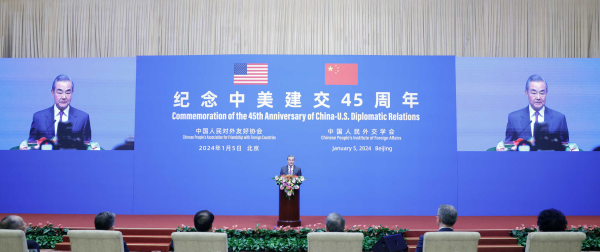BEIJING: Chinese Foreign Minister Wang Yi on Friday said China-U.S. cooperation is no longer optional but rather imperative for each other and the world at large.
Wang, also a member of the Political Bureau of the Communist Party of China (CPC) Central Committee, made the remarks in Beijing during a reception commemorating the 45th anniversary of the establishment of diplomatic relations between China and the United States.
Wang said the two heads of state emphasized the need to continue to be committed to stabilizing and developing bilateral relations to benefit the two countries and the world.
Over the past 45 years, China-U.S. relations have overcome difficulties and forged ahead, with the scope of cooperation reaching an unprecedented level.

Chinese Foreign Minister Wang Yi, also a member of the Political Bureau of the CPC Central Committee, delivers a speech at a reception commemorating the 45th anniversary of the establishment of diplomatic relations between China and the U.S., in Beijing, China, January 5, 2024. /Chinese Foreign Ministry
Peace, cooperation and win-win
At the reception, Wang stressed the importance of peace, cooperation and win-win when he summarized the bilateral relations over the past 45 years.
“Peace is the most fundamental cornerstone of China-U.S. relations,” he said, adding that no conflict or confrontation between China and the U.S. is the most important dividend of peace for humanity.
He described cooperation as the most correct choice for China and the U.S. to get along.
Cooperation between China and the U.S. is no longer an option but an imperative for both countries and the world, he said, noting that the world has witnessed the power of China-U.S. cooperation in a wide range of areas such as fighting terrorism and responding to global financial crises.
The most essential feature of China-U.S. exchanges is win-win, he said.
Bilateral trade of nearly $760 billion and two-way investment of more than $260 billion between China and the U.S. reflect the two countries’ highly complementary economic structures, deep connection in the global industrial and supply chains, and shared interests in common development, said Wang.
He warned that artificial attempts to decouple the two countries will backfire.
Three proposals
Wang put forward three proposals on implementing the important consensus reached by the two heads of state.
First, he called for upholding mutual respect, adding that the top priority is to establish a correct understanding.
Wang said China hopes that the U.S. will relax its mindset and respect the choices made by the Chinese people and China’s development path, as well as respect China’s core interests and its national sovereignty and territorial integrity in an attitude of equality and inclusiveness.
“We are willing to commit ourselves to building a stable, healthy and sustainable China-U.S. relationship on the basis of mutual respect,” he said.
Second, Wang called for adhering to peaceful coexistence, adding that the top priority is to effectively manage differences.
Despite different social systems and development paths, the two countries should have the vision and determination to seek common ground while reserving differences and not let disagreements and differences dominate or interfere with bilateral relations, he said.
Third, Wang called for upholding win-win cooperation, adding that the cornerstone is to advance mutually beneficial cooperation.
He called on both sides to continue to make full use of various mechanisms that have been restored or established in fields such as diplomacy, economy, finance, commerce and agriculture to build bridges of communication and pave the way for cooperation as soon as possible.




















